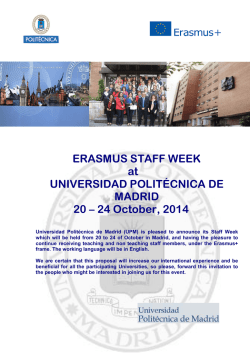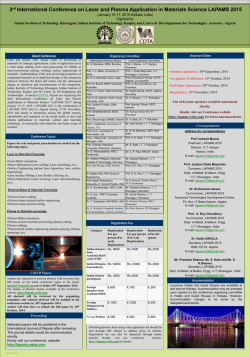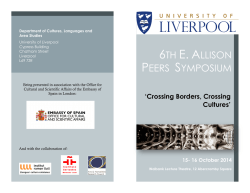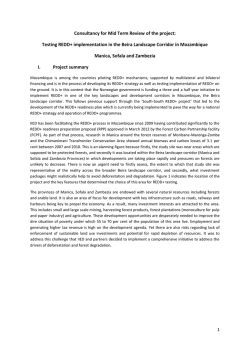
SA-YSSP Final Colloquium Program, 29-30 January 2015
SA-YSSP Final Colloquium Program, 29-30 January 2015 CR Swart Auditorium 29 January 2015 8:50 - Welcome and introduction to proceedings Research Theme and Supervisors Prof Martin Ntwaeaborwa Time Presenter Project Title THEME 12. Water futures and solutions: Developing sustained solutions to improve urban water security in South Africa Supervisors Dr Thokozani Kanyerere Water Program, Department of Earth Sciences, University of the Western Cape, Cape Town, South Africa 9:00 Mr Mayank Prakash, Department of Population Policies and Program, International Institute for Population Science, Mumbai, India Understanding Domestic Water Consumption, Management and its Socio-economic Implication on the Informal Urban Settlements in Mumbai, India Dr. Sylvia Tramberend Water Program, IIASA, Laxenburg, Austria 9:20 Ms Portia Mokoena, Department of Earth Science, University of the Western Cape, Bellville, South Africa Application of Electrical Resistivity method to identify suitable areas for drilling shallow wells in coastal areas Dr. David Wiberg Water Program, IIASA, Laxenburg, Austria THEME 11. Water futures and solutions: Climate change and water security in Africa Supervisors: Prof Yali Woyessa Department of Civil Engineering, Central University of Technology, Bloemfontein, South Africa 9:40 10:00 Dr David Wiberg Water Program, IIASA, Laxenburg, Austria Mr Alois Katiti, Department of Geography and Environmental Science, University of Fort Hare, South Africa Ms Shelly Borga, Department of Energy & Environment, TERI University, India Satellite-based estimation of evapotranspiration of the Green Scheme Irrigation Projects in Namibia A systemic analysis of the food-water-energy nexus for Free State, South Africa using dynamic modeling approach THEME 10. Stability and Complexity of Adaptive Ecological Networks Supervisors: Prof Cang Hui Centre for Invasion Biology, Department of Botany and Zoology, Stellenbosch University, South Africa 10:20 Mr Alan de Barros, Applied Ecology Individual Based Movement Models as a tool to – Conservation Biology, Forestry assess statistical estimation methods applied to Department University of Sao Paulo animal movements -USP, Sao Paulo, Brazil Dr Ulf Dieckman Evolution and Ecology Program, IIASA, Laxenburg, Austria 10:40 Mr Emmanuel Sweke, Marine Allocation of fishing effort among different target Bioresource and Environmental species in North-Eastern Hokkaido, Japan Science/Fisheries Science, Hokkaido University, Japan TEA 11:00 - 11:20 THEME 9. Resilience Measures in Ecosystems and Socio-Economic Networks Supervisors: Dr Ursula Scharler School of Life Sciences, University of KwaZulu-Natal, Durban, South Africa 11:20 Ms Linlin Xia, School of Environment, Beijing Normal University, China Development of a spatially explicit network model of urban carbon metabolism and analysis of the distribution of ecological relationships between system components: model development and a case study of Beijing, China Prof Brian Fath Department of Biological Sciences, Towson University, Towson, 11:40 Mr Arnab Banerjee, Department of Assessment of Ecosystem in Response to Maryland, USA Advanced Systems Analysis Program, IIASA, Zoology, Visva-Bharati University, Fluctuations at the Producer Level Using Network Laxenburg, Austria India Analysis THEME 4. (GAINS) model for integrated local and regional air quality and climate modelling in Southern Africa Supervisors: Prof Harold Annegarn Department of Geography, Environmental Management and Energy Studies, University of Johannesburg, South Africa 12:00 12:20 Dr Peter Rafaj Mitigation of Air Pollution & Greenhouse Gases Programme, IIASA, Laxenburg, Austria Mr Lucas Henneman, Department of Environmental Engineering, Georgia Institute of Technology, USA Ms Carmen Klausbruckner, Faculty of Law, Johannes Kepler University Linz, Austria Assessing emissions levels and costs associated with climate and air pollution policies in South Africa Policy and legal aspects of the implementation of the GAINS-model for a GHG and air quality strategy for South Africa THEME 3. Sustainable cities – Cities as forces for good in the environment Supervisors: Dr Dillip Das Department of Civil Engineering, Central University of Technology, Bloemfontein, South Africa Prof Michael Thompson Risk, Policy and Vulnerability Program, IIASA, Laxenburg, Austria 12:40 Mr Tejas Rawal, Department of Architecture and Planning, Indian Institute of Technology-Roorkee, Uttrakhand State, India 13:00 Mr Serge Kubanza, School of Geography, Archaeology and Environmental Studies, Wits University, South Africa LUNCH 13:20 – 14:00 Sustainable road transportation system in Kanyakumari district, Tamil Nadu, India Some Happy, Others Sad: Exploring Environmental Justice in Solid Waste Management in Kinshasa, the DR-Congo THEME 13. Demographic differential vulnerability to environmental change and climate variability in sub-Saharan Africa Supervisors: Prof Andre Pelser Department of Sociology, University of the Free State, Bloemfontein, South Africa Dr Raya Muttarak World Population Programme, IIASA, Laxenburg, Austria 14:00 Mr Martin Flatoe, Department of Women, Weather, and Woes: The Triangular Economics, Faculty of Social Sciences, Dynamics of Female-Headed Households, University of Oslo, Norway Economic Vulnerability, and Climate Variability in South Africa 14:20 Mrs Moipone Letsie, School of Climate variability, impacts and coping strategies Geography, Archaeology & in south-western Lesotho Environmental Studies, Wits University, Johannesburg, South Africa THEME 5. Mitigation of air pollution and greenhouse gases Supervisors: Prof Charles Mbohwa Department of Quality and Operations Management, Faculty of Engineering and Built Environment, University of Johannesburg, South Africa Dr Manfred Strubegger Energy Program, IIASA, Laxenburg, Austria Prof Holger Rogner Energy Program, IIASA, Laxenburg, Austria 14:40 15:00 15:20 Mr Leonard Azimoh, School of Business, Society and Engineering, Malardalen University, Sweden Mr Shingirirai Mutanga, Department of Industrial Engineering, University of Pretoria, South Africa Mr Munsu Lee, Department of Energy Science Sungkyunkwan University, Republic of Korea Assessment of green mini grid as an alternative energy source to SHS for rural development in South Africa Optimizing the electricity value of sugarcane production systems in Mauritius Energy access and rural development in Southern Africa THEME 7. Dynamical Systems in Ecology: Models, Analysis and Simulations Supervisors: Prof. Jacek Banasiak School of Mathematics, Statistics and Computer Sciences, University of KwaZulu-Natal, Durban, South Africa 15:40 Ms Aleksandra Falkiewicz, Faculty Asymptotic behavior of generalized transport of Technical Physics, Informatics, models on networks Applied Mathematics, Institute of Mathemathics, Lodz University of Technology, Lodz, Poland Prof. Alexey Davydov Advanced Systems Analysis Program, International Institute for Applied Systems Analysis (IIASA), Laxenburg, Austria / Steklov Institute, Russia INVITED LECTURE: Strategic positioning of systems analysis research in response to evolving global challenges, Dr Gansen Pillay, Deputy CEO, National Research Foundation, Pretoria South Africa CLOSING REMARKS 16:30 Prof Martin Ntwaeaborwa 30 January 2015 08:50 – Welcome Prof Martin Ntwaeaborwa 09:00 – INVITED LECTURE: World population trends and adaptive capacity to climate change, Prof Wolfgang Lutz, Director: World Population Program, IIASA Research Theme and Supervisors Time Presenter Project title THEME 8. STABILITY AND COMPLEXITY OF ADAPTIVE ECOLOGICAL NETWORKS Supervisors: Prof Wijnand Swart Department of Plant Sciences, University of the Free State, Bloemfontein, South Africa 10:00 10:20 Dr Gergely Boza Evolution and Ecology Program, IIASA, Laxenburg, Austria Dr. Ulf Dieckmann Evolution and Ecology Program, IIASA, Laxenburg, Austria Mrs Anette Alleman, Department of Plant Sciences, University of the Free State, Bloemfontein, South Africa Mr Michael Chung, Department of Plant Sciences, University of the Free State, Bloemfontein, South Africa Can symbionts in soya beans reduce the incidence and severity of disease The influence of sorghum root physiology on rhizosphere interactions and their effect on incidence of root disease THEME 2. Social acceptance of land use requirements for renewable energy in South Africa: Critical considerations Supervisors: 10:40 Dr Vain Jarbandhan Department of Public Governance, University of Johannesburg; South Africa Mr Elvis Nkoana, Institute for Environment and Sustainable Development, University of Antwerp, Belgium "How does climate change awareness impact perceptions of major risks in rural and township areas of Limpopo Province, South Africa? Dr Nadejda Komendantova Risk, Policy and Vulnerability Programme, International IIASA, Laxenburg, Austria TEA 11:00-11:20 THEME 1. Extract of Africa: Towards the equitable and ecologically-sound governance of mining and drilling Supervisors: 11:20 Ms Maria Rivera, Department of To REDD or not to REDD? Arriving at ‘clumsy’ Dr Ikechukwu Umejesi Geography, University of Maryland, solutions to reform the governance of Reducing Department of Sociology, University of South Africa, Pretoria, USA Emissions from Deforestation and Forest South Africa Degradation (REDD)…BUT ALSO is it appropriate for the Virunga Park, DRC? Prof Michael Thompson 11:40 Mr Emmanuel Vellemu, Institute The enemy at the Gate: Can the cultural theory Risk, Policy and Vulnerability Program, IIASA, Laxenburg, for Water Research, Rhodes approach save the day? The case of acid mine Austria University, South Africa drainage in Mpumalanga, South Africa CLOSING REMARKS 12:00 Prof David Katerere LUNCH 12:30 – 13:30
© Copyright 2026



